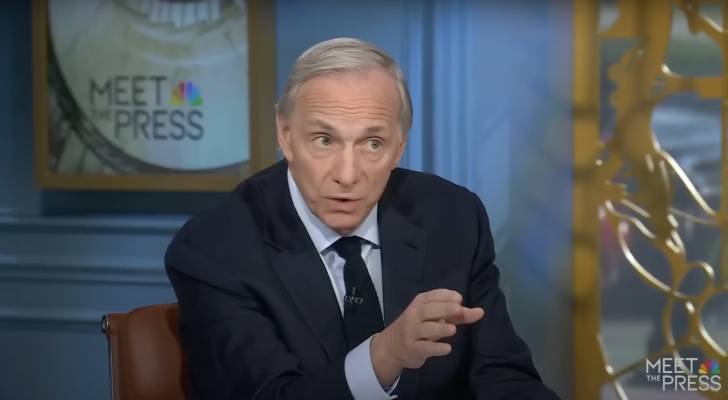
The founder of Bridgewater Associates, one of the world’s largest hedge funds, is voicing concern that President Donald Trump’s economic agenda could lead to “something worse than a recession.”
“Right now, we are at a decision-making point and very close to a recession,” billionaire investor Ray Dalio told NBC’s Meet the Press. “And I’m worried about something worse than a recession if this isn’t handled well.”
A recession is typically defined as two consecutive quarters of negative GDP growth. A much more “profound” change would be a breakdown of the current monetary order. (It’s worth pointing out that Dalio correctly predicted the 2008 financial crisis.)
Don’t miss
- I’m 49 years old and have nothing saved for retirement — what should I do? Don’t panic. Here are 5 of the easiest ways you can catch up (and fast)
- Gain potential quarterly income through this $1B private real estate fund — even if you’re not a millionaire. Here’s how to get started with as little as $10
- Thanks to Jeff Bezos, you can now become a landlord for as little as $100 — and no, you don’t have to deal with tenants or fix freezers. Here’s how
What’s worse than a recession?
Trump has triggered global economic chaos with his on-again, off-again tariffs, most recently declaring a 90-day pause on ‘reciprocal’ tariffs — except for China.
In that case, tariffs have increased to 145%. With markets in turmoil and consumer confidence plummeting, more economists believe a recession is likely.
But Dalio believes Americans could be facing more than a recession. Tariffs, combined with a high level of debt and a rising superpower challenging the existing superpower, could lead to “profound changes” in the world order.
“Such times are very much like the 1930s,” he told NBC.
The end of the Second World War ushered in a new monetary and geopolitical world order. But history tends to repeat itself.
“These go in cycles that can be measured, and I worry about the breakdown of that kind of order, particularly since it doesn’t need to happen,” he told NBC, adding that there are better ways to restructure debt.
Whether tariffs are implemented in a “stable” way or a “chaotic and disruptive way” can make “all the difference in the world,” he said. But so far, the tariffs have been akin to “throwing rocks into the production system.” In other words, highly disruptive.
“Right now we’re at a juncture,” he told NBC. He believes Congress needs to get the budget deficit down to 3% of GDP while managing trade deficits “in the right way.” If not, there will be a supply-demand issue for debt and “the results of that will be worse than a normal recession.”
Read more: Car insurance premiums could spike 8% by the end of 2025 — thanks to tariffs on car imports and auto parts from Canada and Mexico. But here’s how 2 minutes can save you hundreds of dollars right now
How can you prepare your finances?
If you’re an average American, how can you heed Dalio’s warning? Start by establishing an emergency fund (if you don’t already have one) that will cover at least three to six months of expenses — perhaps more, if you’re in a job that could be impacted by tariffs and trade wars.
Pay down high-interest debt (like credit cards) and avoid building up more debt if possible. While times of uncertainty can lead to retail therapy — where we buy something to get a temporary hit of dopamine to combat our stress and anxiety — you’ll likely feel better in the long run if you cut back on unnecessary spending.
After you’ve taken care of your emergency fund and high-interest debt, you can prioritize saving for retirement and other long-term goals. You may want to consider diversifying your income stream, like taking on a side hustle, or reskilling to manage changes in the job market.
It may also be a good time to diversify your investments across different asset classes to mitigate risk. That might mean adjusting your mix of stocks, bonds and other assets.
If you’re close to retirement, you might want to shift to lower-risk assets, like dividend-paying stocks. Alternative investments , such as gold and real estate, are often considered a hedge against inflation and recession.
If you’re new to hedging — a risk management strategy that can help offset losses by purchasing investments in an opposite position to an existing investment — you may want to consult with a financial advisor to see how this could help mitigate risk in your portfolio.
Depending on whether you’re close to retirement or not, you may want to adjust your retirement strategy — and adjust your risk tolerance to match that strategy. If you’re a young investor, you still have time for the market to recover, so avoid panic selling.
What to read next
- Want an extra $1,300,000 when you retire? Dave Ramsey says this 7-step plan ‘works every single time’ to kill debt, get rich in America — and that ‘anyone’ can do it
- Here are 5 ‘must have’ items that Americans (almost) always overpay for — and very quickly regret. How many are hurting you?
- There’s a 60% chance of a recession hitting the American economy this year — protect your retirement savings with these essential money moves ASAP (most of which you can complete in just minutes)
This article provides information only and should not be construed as advice. It is provided without warranty of any kind.